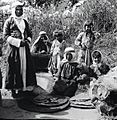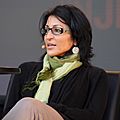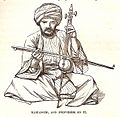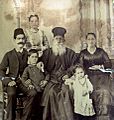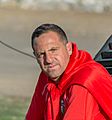Palestinians facts for kids
| Total population | |
|---|---|
| c. 13,000,000 | |
| Regions with significant populations | |
| State of Palestine | 4,750,000 |
| – West Bank | 2,930,000 (of whom 809,738 are registered refugees (2017)) |
| – Gaza Strip | 1,880,000 (of whom 1,386,455 are registered refugees (2018)) |
| Jordan | 2,175,491 (2017, registered refugees only)–3,240,000 (2009) |
| Israel | 1,890,000 (60% of Israeli Arabs identify as Palestinians (2012)) |
| Syria | 552,000 (2018, registered refugees only) |
| Chile | 500,000 |
| Lebanon | 174,000 (2017 census)–458,369 (2016 registered refugees) |
| Saudi Arabia | 400,000 |
| Qatar | 295,000 |
| United States | 255,000 |
| United Arab Emirates | 91,000 |
| Germany | 80,000 |
| Kuwait | 80,000 |
| Egypt | 70,000 |
| El Salvador | 70,000 |
| Brazil | 59,000 |
| Libya | 59,000 |
| Iraq | 57,000 |
| Canada | 50,975 |
| Yemen | 29,000 |
| Honduras | 27,000–200,000 |
| United Kingdom | 20,000 |
| Peru | 15,000 |
| Mexico | 13,000 |
| Colombia | 12,000 |
| Netherlands | 9,000–15,000 |
| Australia | 7,000 (rough estimate) |
| Sweden | 7,000 |
| Algeria | 4,030 |
| Languages | |
| Palestine and Israel: Palestinian Arabic, Hebrew, English and Greek Diaspora: Other varieties of Arabic, the vernacular languages of other countries in the Palestinian diaspora |
|
| Religion | |
| Majority: Sunni Islam Minority: Christianity, Samaritanism, Druze, Shia Islam, non-denominational Muslims |
|
| Related ethnic groups | |
| Other Levantines, other Semitic-speaking peoples, Jews (Ashkenazim, Mizrahim, Sephardim), Assyrians, Samaritans, other Arabs, and other Mediterranean peoples. | |
The Palestinian people, or simply Palestinians, are an Arab people whose families come from the region of Palestine. This area includes places like the West Bank, the Gaza Strip, and Israel.
Today, most people called "Palestinians" are Arabs. However, in the past, the term "Palestinians" could also refer to Jewish people who lived in Palestine.
There are about 13 million Palestinians in the world. About half of them still live in the historic Palestine region. The other half live in many different countries around the world. This spread of people is called the Palestinian diaspora. Many Palestinians living outside Palestine are refugees, meaning they had to leave their homes.
Contents
Who are the Palestinians?
Palestinians are a group of people who share a common history and culture. They speak Arabic, especially the Palestinian dialect. Most Palestinians are Muslims, mainly from the Sunni branch of Islam. There are also many Palestinian Christians and smaller groups like Druze and Samaritans.
Scientists have found that Palestinians are descendants of people who have lived in the area for a very long time. Over centuries, many of them adopted the Arabic language and converted to Islam.
Palestinian Identity
The idea of a "Palestinian people" as a distinct group with a shared national identity became stronger before World War I. People started asking for independence for Palestine in the early 1920s.
After the creation of Israel in 1948 and another major event in 1967, many Palestinians moved to other countries. This led to a stronger feeling of shared history and a desire for a Palestinian nation-state.
The Palestine Liberation Organization (PLO) represents the Palestinian people to the world. The Palestinian National Authority helps manage daily life in some Palestinian areas in the West Bank and Gaza Strip.
Famous Palestinians
Many Palestinians have become well-known in different fields:
- Yasser Arafat – A famous leader of the PLO.
- Mahmoud Abbas – The current leader of Fatah.
- Edward Said – A well-known philosopher and writer.
- Mahmoud Darwish – A very important Palestinian poet.
- Susan Abulhawa – A Palestinian novelist.
- Naomi Shihab Nye – A Palestinian-American writer.
- Samah Sabawi – A Palestinian writer and journalist.
Palestinian Culture
Palestinian culture is rich and diverse, influenced by centuries of history in the Middle East. It includes traditional music, dance, food, and clothing.
Traditional Food
Palestinian food is a big part of their culture. Some popular dishes include:
- Musakhan: This is often called the national dish. It's chicken roasted with onions, sumac, and olive oil, served over flatbread.
- Hummus: A creamy dip made from chickpeas, tahini, lemon juice, and garlic. It's very popular across the Middle East.
- Falafel: Deep-fried balls or patties made from ground chickpeas or fava beans.
- Kanafeh: A sweet dessert made with thin noodle-like pastry, cheese, and sweet syrup.
Music and Dance
Music and dance are important in Palestinian celebrations. The Dabke is a lively folk dance performed in a line, often at weddings and other happy events. Traditional instruments like the Kamanjah (a type of violin) are also used.
Traditional Clothing
Traditional Palestinian clothing is known for its beautiful embroidery, especially on women's dresses. The keffiyeh is a traditional headscarf worn by men, which has become a symbol of Palestinian identity.
Images for kids
-
A loom at work making a traditional Palestinian keffiyeh in Hebron, Palestine. The keffiyeh is a traditional headdress with origins in Arabia
-
A veiled Arab woman in Bersheeba, Palestine c.1940
-
Palestinian children in Hebron
-
Edward Said and Daniel Barenboim in Sevilla, 2002
-
Protest for Palestine in Tunisia
-
Christians from Gaza
-
Palestinian Druze family making bread 1920
-
Mahmoud Darwish, Palestinian poet
-
Palestinians attending prayers at the Dome of the Rock in Jerusalem
-
Palestinian Christian Scouts on Christmas Eve in front of the Nativity Church in Bethlehem, 2006
-
Tomb of Jethro in Hittin, Northern Israel.
-
Muslims pray in Jerusalem, 1840. By David Roberts, in The Holy Land, Syria, Idumea, Arabia, Egypt, and Nubia
-
A Palestinian Christian family in Ramallah, Ottoman Palestine, 1905
-
Married Eastern Orthodox priest from Jerusalem with his family (three generations), circa 1893
-
Musakhan: The Palestinian National dish.
-
Kanafeh: a Palestinian dessert.
-
Young woman of Ramallah wearing dowry headdress, c. 1898–1914
-
Ramallah woman, c. 1920, Library of Congress
-
Palestinian women dancing traditionally, Bethlehem c. 1936
See also
 In Spanish: Pueblo palestino para niños
In Spanish: Pueblo palestino para niños
 | Laphonza Butler |
 | Daisy Bates |
 | Elizabeth Piper Ensley |











